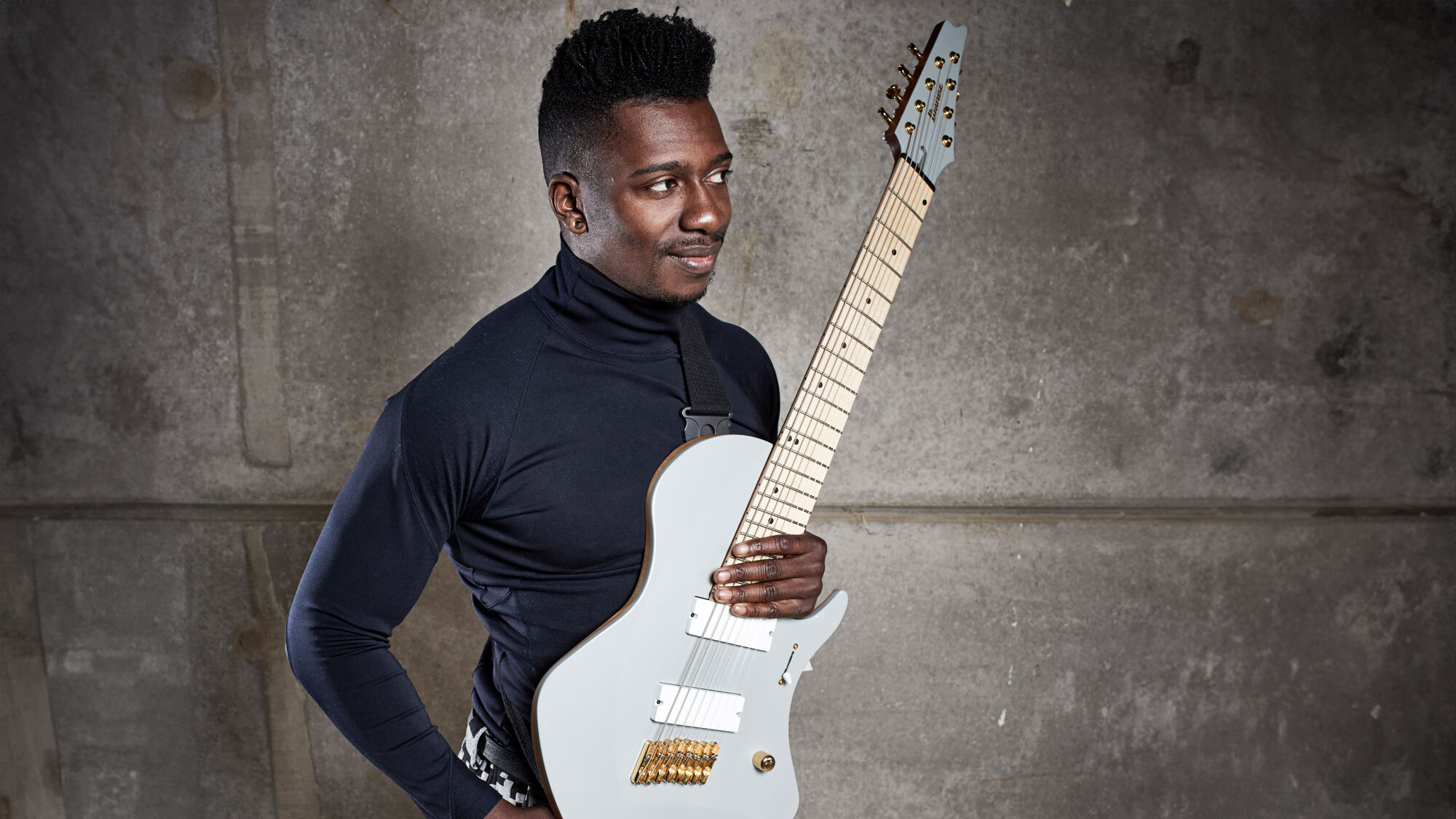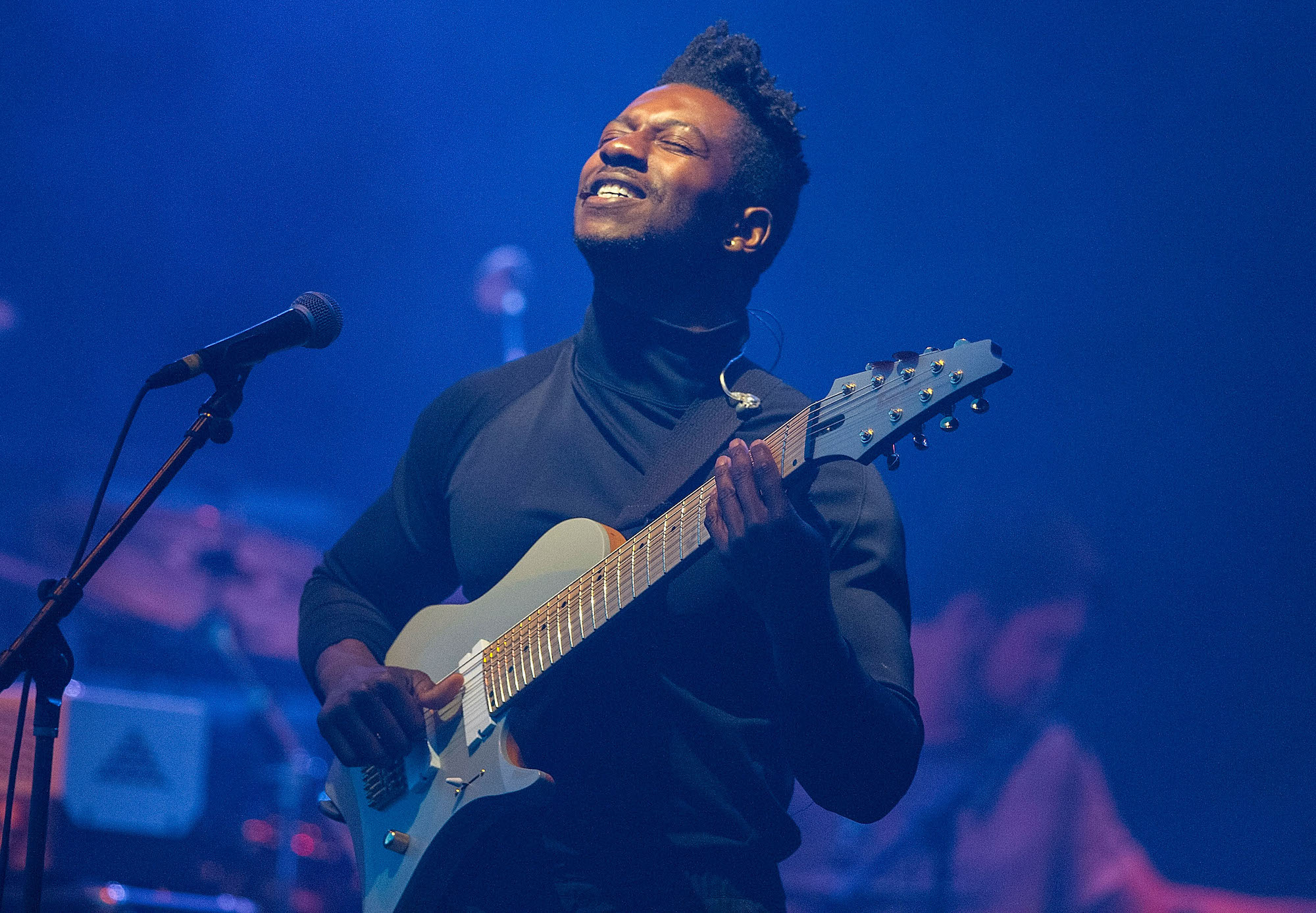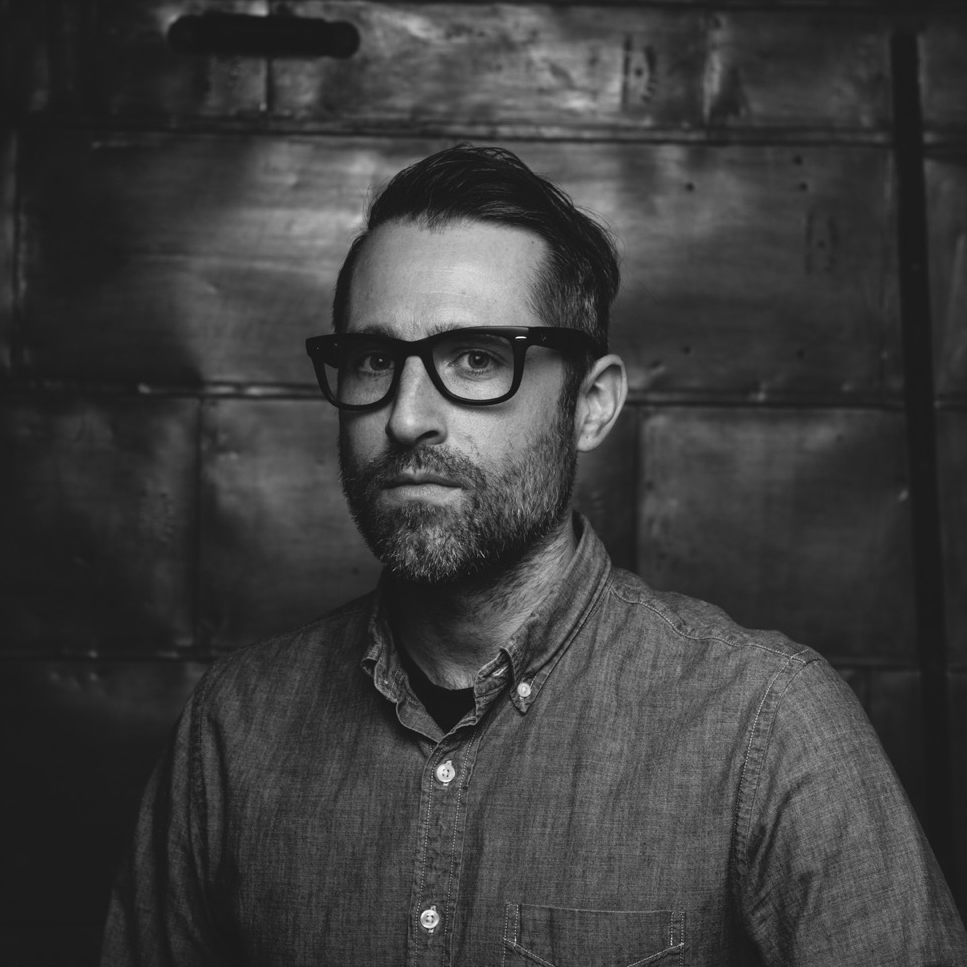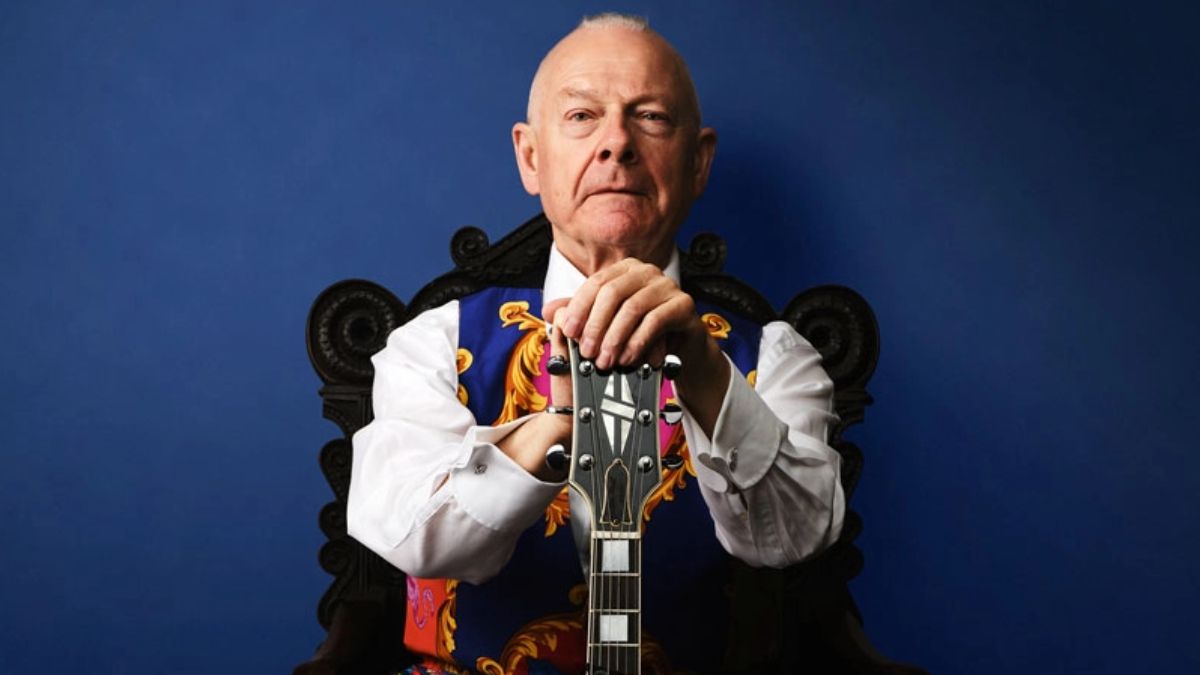“For me to be so appreciated, I think I can start to feel guilty and pressured. But I guess it’s a good problem to have”: From playing Steve Vai's guitars to playing with him onstage, Tosin Abasi's rapid ascent made him one of the biggest names in guitar
Speaking to Guitar World in 2014, the Animals As Leaders maestro recalls the grueling salmon cannery and poop-scooping dog kennel jobs that helped him save for his first Vai signature model, and discusses how to adapt to seven- and eight-string models

This interview with Tosin Abasi was first published in Guitar World in 2014.
The Animals As Leaders guitarist has quickly risen to the top of the new school of virtuoso players… and he used to shovel dog poop for a living. But what Guitar World readers really want to know is…
Where does your impeccable fashion sense come from? Some of your outfits are out of this world. – William Best
“[laughs] Well, I go on fashion blogs like the Sartorialist or FaceHunter, and look at a lot of street fashion. My brother is actually a fashion designer and he’s influenced me. I had a girlfriend for close to 10 years, and she was a huge influence on me, too.
“I don’t really separate things. I love music and I love aesthetic art as well. I feel like there’s a thread between visual art and music. Sometimes a designer can give me a similar feeling and impact me as strongly as hearing a really cool song or a really great guitar player.”
I am currently a freshman enrolled in a Jazz Studies Associates Degree program at Berklee College of Music. But I am debating switching to Atlanta Institute of Music because of the significant costs of Berklee. As a graduate of AIM, I was wondering if you could explain what you feel are the advantages of that program. – John Karkosiak
“It’s hard for me to speak in contrast, because I didn’t go to Berklee. But I chose AIM partially because I didn’t want to take any other core subjects, like history, math, or any of that. I just wanted to focus on music.
All the latest guitar news, interviews, lessons, reviews, deals and more, direct to your inbox!
“AIM is good for that because it’s a condensed curriculum focused on music, and you can complete the curriculum in one year. And I didn’t want to spend four years without touring or gigging. So if you want to get a really condensed, concentrated musical education without being out of the scene for a few years, and save money, I think AIM is perfect.”
Was there ever a defining moment in your life where you felt like you had “arrived” as a musician? – David White-Goode
“Man, I’d say meeting Steve Vai and having him express liking my music. That was pretty… [pauses] I mean, I used to play his signature guitar! This is a guy that basically spearheaded the genre that I’m participating in.
“Just as a person, he’s got this guru vibe. The Guitar World cover that I was on with Steve [September 2012] was a big deal, too. And getting a signature Ibanez guitar is ridiculous. Those three instances have been, like, ‘Oh, this is a real thing!’”

I’ve been a six-string player since I learned guitar five years ago, but now I’m interested in expanding my sound. What advice would you give on how to transition to seven- and eight-string guitars? – Toby Schlitz
“I recommend getting a seven-string first and working on things like octave identification and recognizing patterns on the fretboard. This will help you better integrate the extra string.
“Another cool thing is to practice six-string material while avoiding the seventh string; then, once you’re comfortable, start writing material that incorporates the seventh string. This way, you’ll get used to knowing that extra string is there, and when you start writing your own material, it’ll be coming from an intuitive place.
“You should also learn seven-string music by other musicians and take chord voicings for six-strings and translate and revoice them on the seven-string.”
When you were younger, were you better at hand-eye coordination than other kids, like with video games, sports, and so on? Just curious, because there always seems to be something that separates a prodigy from the average player. – Jon Dallaire
“I don’t know that I was better than at sports than other kids. I mean, I was decent at some sports, like baseball, soccer, football, and hockey, but I just played them for fun. I was actually more into visual art. I would illustrate a lot and do comic books and stuff like that. That was my first creative outlet before guitar, and I guess that’s hand-eye coordination.”
In an interview a short while ago, you mentioned that you practiced yoga. How strongly has that practice affected you as a guitar player? – Broken_Hyren
“I think yoga is amazing. I also practice transcendental meditation. Both those things help to center you. So when you’re thinking about creativity, it comes from a source – an inner source. When you’re meditating, you’re bringing your consciousness to that centered source of creativity and intelligence. I think it’s reinforced my creativity. And even physically, it’s helped my response time and reflexes.
“Being centered and aligned allows you to execute anything physical more proficiently. I still do both yoga and mediation, and I think they’re super beneficial whether you play guitar or not.”

You often talk about how transcendental mediation can jump-start creativity. I’m wondering if you explore any other methods, like smoking herb? – Hong Bit
“[laughs] I have experimented with various substances. Smoking a little weed can definitely get the creative juices flowing. But I don’t know if I’d tell other people to go out and do that. Everyone has their own method, but I think meditation is something that will benefit you holistically. It doesn’t take away from your body; it actually reinforces you. In my opinion, it’s the best way to tap into creativity.”
You’ve been on the cover of Guitar World twice, and you’re always being hailed as one of the greatest new guitarists out there. Does that kind of attention cause you to feel extra pressure? Does it bother you, or maybe motivate you? – Frank Harris
“It’s starting to get a little bit weird, actually. And I’m sure there will be the inevitable negative backlash that comes along. Yeah, it means that if I pick up a guitar in front of someone who knows me, I’d better sound like one of the best guitar players on the planet. [laughs]
“It’s kinda stressful, man! I really appreciate the positive reinforcement, but I think there are so many other super-talented, under-recognized guitar players out there. So for me to be so prevalently appreciated, I think I can start to feel guilty and kinda pressured. But I guess it’s a good problem to have.”
What did you do for a living before Animals As Leaders? And do you still have to work a day job when you’re off tour? – Buddy “Victory Boy” Yarnall
“Dude, when I was going to the Atlanta Institute of Music, I worked at a dog kennel. It was a boarding facility, and I was cleaning up shit and piss in a concrete room with 40 dogs barking at me at the top of their lungs. [laughs] I also worked at a fish cannery in Alaska, where I processed salmon for, like, 16 hours a day. That’s actually how I saved up to buy my Steve Vai guitar.
“I’ve worked in coffee shops. I’ve done a lot of odd jobs. But now I just play guitar for a living. Between the clinics, tours, and lessons, I make enough money to get by.”

Have you ever consider putting vocals in Animals As Leaders? Not saying you need to. I think your sound is awesome. Just wondering. Can you sing at all? – Russell Davis
“I do not sing. [laughs] And vocals? I don’t think so. We like that it’s an instrumental band. But maybe future projects would involve me working with a vocalist.”
I’d love to get some tips on how you structure your practice routine. Do you separate your practice into sections, such as technique, composition, etc.? – Max Liebenberg
“I think it’s a good idea to section your practice sessions. I’ve been playing for 18 years, so my routines have changed. But I used to always warm up to a metronome while doing alternate-picking exercises, then maybe legato exercise and string-skipping exercises.
“Then, I’d spend 20 to 30 minutes reading music. Then I would usually pop in an instructional video and work on something that was cool from the video. But I’d say metronome-based practice is about as structured as I get these days.”
Brad is a Brooklyn-based writer, editor and video producer. He is the former content director of Revolver magazine and executive editor of Guitar World. His work has appeared in Vice, Guitar Aficionado, Inked and more. He’s also a die-hard Les Paul player who wishes he never sold his 1987 Marshall Silver Jubilee half stack.

